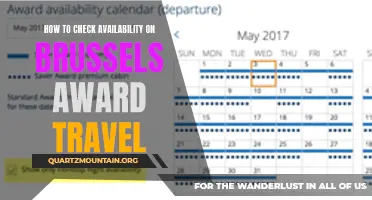
When it comes to traveling to the United States with an F1 visa, timing is everything. The F1 visa is a non-immigrant student visa that allows international students to study in the US. While obtaining the visa is just the first step, knowing when you can travel with it is equally important. This article will delve into the various factors that determine when you can enter the US with an F1 visa, such as program start date, visa issuance date, and pre-arrival preparations. So if you're planning to pursue your education in the land of opportunity, fasten your seatbelt as we take you through the journey of when you can travel to the US with an F1 visa.
What You'll Learn

F1 Visa Eligibility for Travel to the US
If you hold an F1 visa and are planning to travel to the United States, it is important to be aware of the eligibility requirements and guidelines for traveling. The F1 visa is a nonimmigrant visa that allows international students to study full-time at an accredited educational institution in the United States. Here is what you need to know about F1 visa eligibility for travel to the US:
Enrolled in an Accredited Educational Institution:
To be eligible for travel to the US with an F1 visa, you must be enrolled as a full-time student at an accredited educational institution. This institution can be a university, college, high school, language program, or other academic or vocational institution recognized by the US government.
Active Student Status:
You need to maintain your active student status by enrolling and attending classes full-time. This means that you should be registered for the required number of credit hours or academic units, as specified by your educational institution, and attend classes regularly. It is important to adhere to the rules and regulations of your school to maintain lawful F1 status.
Valid Form I-20:
You must have a valid Form I-20, also known as the Certificate of Eligibility for Nonimmigrant Student Status. This is a document issued by your school that confirms your acceptance and enrollment as a full-time student. It is essential to have an updated and valid Form I-20 for travel purposes.
Valid F1 Visa Stamp:
Your F1 visa stamp should be valid and unexpired. The F1 visa stamp is usually affixed to your passport by a US embassy or consulate. Check the expiration date on your visa stamp before making any travel arrangements. It is important to note that the expiration of your F1 visa does not necessarily mean the end of your lawful student status in the US as long as you have a valid Form I-20.
Valid Passport:
Your passport must be valid for at least six months beyond the planned date of entry into the United States. Make sure your passport is not damaged or expired before making any travel plans.
Financial Support:
You should be able to demonstrate sufficient financial support to cover your educational and living expenses while in the United States. This may include showing bank statements, scholarship letters, or other proof of funding.
Travel Authorization:
While an F1 visa allows you to study in the US, it is important to check if you need any additional travel authorization documents depending on your country of citizenship. In some cases, travelers may need to obtain an Electronic System for Travel Authorization (ESTA) or a visa waiver.
Consistent with Travel Restrictions:
Due to the ongoing COVID-19 pandemic, it is important to stay updated on travel restrictions and requirements set by the US government. Make sure to check the official websites of the US embassy or consulate in your country for the most up-to-date information on travel restrictions, COVID-19 testing requirements, and quarantine protocols.
Education-related Travel:
When traveling, it is advisable to carry supporting documents such as your school ID, acceptance letter, course schedule, and contact information of your Designated School Official (DSO) or International Student Office. These documents may help clarify your purpose of travel to US immigration officials.
Return to School:
Finally, when planning your travel, make sure to take into consideration the academic calendar of your educational institution. Returning to the US within a reasonable timeframe before the start of classes or the resumption of your academic program is important to ensure a smooth transition and avoid any complications in maintaining your F1 student status.
Remember, it is crucial to consult with your Designated School Official (DSO) or International Student Office for any specific regulations or requirements pertaining to your F1 visa and travel plans. They can provide you with the latest guidance and information to ensure a successful journey to the United States.
Can My Daughter Travel on My Visa? A Helpful Guide for Parents
You may want to see also

Required Documents for Travel on an F1 Visa
If you are an international student studying in the United States on an F1 visa, you may have questions about traveling in and out of the country. It is important to understand the required documents you will need to have in order to travel on your F1 visa. This blog post will provide you with a detailed list of the necessary documents and explain why they are important.
- Valid Passport: Your passport must be valid for at least six months beyond your intended stay in the United States. Make sure to check the expiration date of your passport and, if needed, renew it before your upcoming travel.
- Valid F1 Visa: Your F1 visa stamp should be valid and not expired. If your visa has expired, you will need to apply for a new one at a U.S. embassy or consulate in your home country before you can travel to the United States.
- SEVIS I-20 Form: This is the document issued by your designated school that certifies your legal status as an F1 student. Make sure your I-20 form has been properly signed by your school's designated official within the last six months. It is also important to verify that your I-20 form has not expired.
- Valid I-94 Arrival/Departure Record: You can access your I-94 record online at the U.S. Customs and Border Protection website. Make sure that your I-94 record shows your current status as an F1 student, and that it has not expired.
- Proof of Enrollment: Carry proof of your current enrollment or registration at your U.S. school. This can be a letter from your school or a copy of your current semester's class schedule.
- Financial Documentation: It is important to have evidence of sufficient funds to cover your expenses while in the United States. This can include bank statements, scholarship award letters, and any other documents that prove your financial capability.
- Travel Endorsement on I-20: If you are planning to travel outside the United States and return while on your F1 visa, you will need to have a travel endorsement on your I-20 form. This endorsement must be signed by your school's designated official and should be dated within the last six months.
- Proof of Intent to Return: It is important to show evidence that you intend to return to your home country after completing your studies. This can include documents such as a return ticket, a letter from your employer stating your job position, or any other proof that you have compelling ties to your home country.
- COVID-19 Related Documents: Due to the ongoing COVID-19 pandemic, additional documents may be required for travel. Make sure to check for any travel restrictions or requirements imposed by the U.S. government or your home country.
- Additional Documents: It is always a good idea to carry any other relevant documents that may be required by U.S. immigration officials, such as proof of medical insurance, a letter explaining the purpose of your travel, or any other supporting documentation.
Remember to keep these documents secure and easily accessible during your travel. It is also recommended to make copies of all your important documents and keep them in a separate place, in case of loss or theft.
By ensuring you have all the necessary documents, you can have a hassle-free travel experience while studying in the United States on your F1 visa. Safe travels!
How to Redeem Travel Points with Visa: The Ultimate Guide
You may want to see also

Travel Restrictions and Limitations for F1 Visa Holders
As an F1 visa holder, it's important to understand the travel restrictions and limitations that apply to you. While the F1 visa allows you to study in the United States, there are specific rules you need to follow when it comes to traveling to and from the country.
- Valid Visa: First and foremost, ensure that you have a valid F1 visa in your passport. This visa allows you to enter the United States for the purpose of studying at a recognized institution. Make sure that your visa has not expired and check the expiration date before planning any travel.
- Maintaining Status: To travel to the United States, you need to maintain your F1 status. This means that you must be enrolled in a full course load and be making satisfactory progress towards your degree. If you are on Optional Practical Training (OPT), ensure that your travel plans do not interfere with your employment authorization.
- SEVIS: The Student and Exchange Visitor Information System (SEVIS) is a vital component for F1 visa holders. Before traveling, ensure that your SEVIS record is up to date and your Designated School Official (DSO) has endorsed your travel on the I-20 form. It's important to have a valid travel signature on your I-20 within the past 12 months.
- Travel Authorization: Certain students may require travel authorization before leaving the United States. If you are a citizen of a country participating in the Visa Waiver Program, you will need to obtain an electronic System for Travel Authorization (ESTA) approval prior to travel. Other students from countries not participating in the Visa Waiver Program should check with their local U.S. embassy or consulate for any specific travel requirements.
- Valid Passport: Always ensure that your passport is valid for at least six months beyond your intended period of stay in the United States. It's essential to renew your passport if the expiration date is approaching.
- Returning to the United States: When planning your return to the United States, make sure to carry all the necessary documents, including a valid passport, visa, and I-20 with a recent travel signature. Additionally, carry any other supporting documents that may be required, such as transcripts, proof of enrollment, or financial documents.
- Travel Restrictions: Keep in mind that travel restrictions and limitations can change unexpectedly. Stay up to date with any travel advisories or restrictions, including those related to COVID-19. It's recommended to consult with your DSO or the nearest U.S. embassy or consulate for the latest information regarding travel to the United States.
- Reinstating F1 Status: If you have violated your F1 status or fallen out of status, it's important to consult with your DSO or an immigration attorney before making any travel plans. Reentering the United States after a status violation may result in denial of entry, so it's crucial to address any status issues before attempting to travel.
Remember, it's always a good idea to plan your travel well in advance and seek guidance from your DSO or an immigration attorney if you have any specific questions or concerns. By being aware of the travel restrictions and limitations for F1 visa holders, you can ensure a smooth and hassle-free travel experience to and from the United States.
Understanding the Importance of Travel Visas: Exploring Their Purpose and Implications
You may want to see also

Best Time to Travel to the US on an F1 Visa
If you have been accepted into a university in the United States and have obtained an F1 visa, you may be wondering when is the best time to travel to the US. Timing is crucial when it comes to planning your journey, as this can affect your academic and personal life. Here are a few important factors to consider to help you determine the best time to travel to the US on an F1 visa:
- Visa Validity: Firstly, check the validity of your F1 visa. Usually, F1 visas are issued for the duration of your academic program, plus an additional 60 days. Ensure that your visa is still valid and will cover your planned duration of stay in the US.
- Student Orientation: Many universities organize orientation programs for international students, typically a few days before the start of the semester. Attending these orientations can be beneficial as they provide important information about campus life, academics, and immigration regulations. It is advisable to arrive early enough to participate in these orientation programs.
- Semester Start Date: Your university's academic calendar will specify the start date of each semester. It is recommended to arrive at least a few days before the semester begins to settle in, explore the campus, and take care of any administrative tasks such as opening a bank account or getting a local phone number.
- Travel Restrictions: Check for any travel restrictions or advisories issued by your home country or the US government. These restrictions may include testing requirements, quarantine rules, or flight availability. Ensure that you comply with all the necessary travel regulations before booking your flight.
- Personal Factors: Consider your personal circumstances when determining the best time to travel. If you need some time to say goodbye to family and friends, it may be beneficial to arrive a bit earlier. On the other hand, if you have other commitments or need to complete some formalities in your home country, plan accordingly.
- Budget Considerations: Keep in mind that traveling during peak seasons, such as holidays or summer breaks, can result in higher airfare and accommodation costs. If budget is a concern, try to plan your travel during off-peak times when prices are typically lower.
- Weather Conditions: Depending on the location of your university, you may want to consider the weather conditions. Traveling during extreme weather like hurricanes or snowstorms can disrupt your journey and make settling in more challenging. Stay updated on weather forecasts and plan accordingly.
Once you have considered these factors, you can make an informed decision about the best time to travel to the US on an F1 visa. Remember to plan ahead, allowing yourself enough time to settle in and make a smooth transition to your new academic life. Safe travels!
Understanding the Requirements on a Travel Visa to China: What You Need to Know
You may want to see also
Frequently asked questions
You can travel to the US with an F1 visa up to 30 days before the start date of your program, as listed on your I-20 form.
Yes, you must have a valid F1 visa in order to enter the US as an international student. This visa should be obtained before your travel.
Generally, you are not allowed to enter the US on an F1 visa if your program start date has already passed. It is advisable to contact your designated school official (DSO) for further guidance.
Yes, you can travel outside the US during your studies on an F1 visa. However, you should make sure to have all necessary documents, such as a valid passport, a valid F1 visa, and a properly endorsed I-20 form, before you leave the country.
Yes, you can travel to the US for vacation purposes as an F1 visa holder. However, you should make sure to inform your designated school official (DSO) about your plans and ensure that you have all necessary documents and proper authorization from your school.







